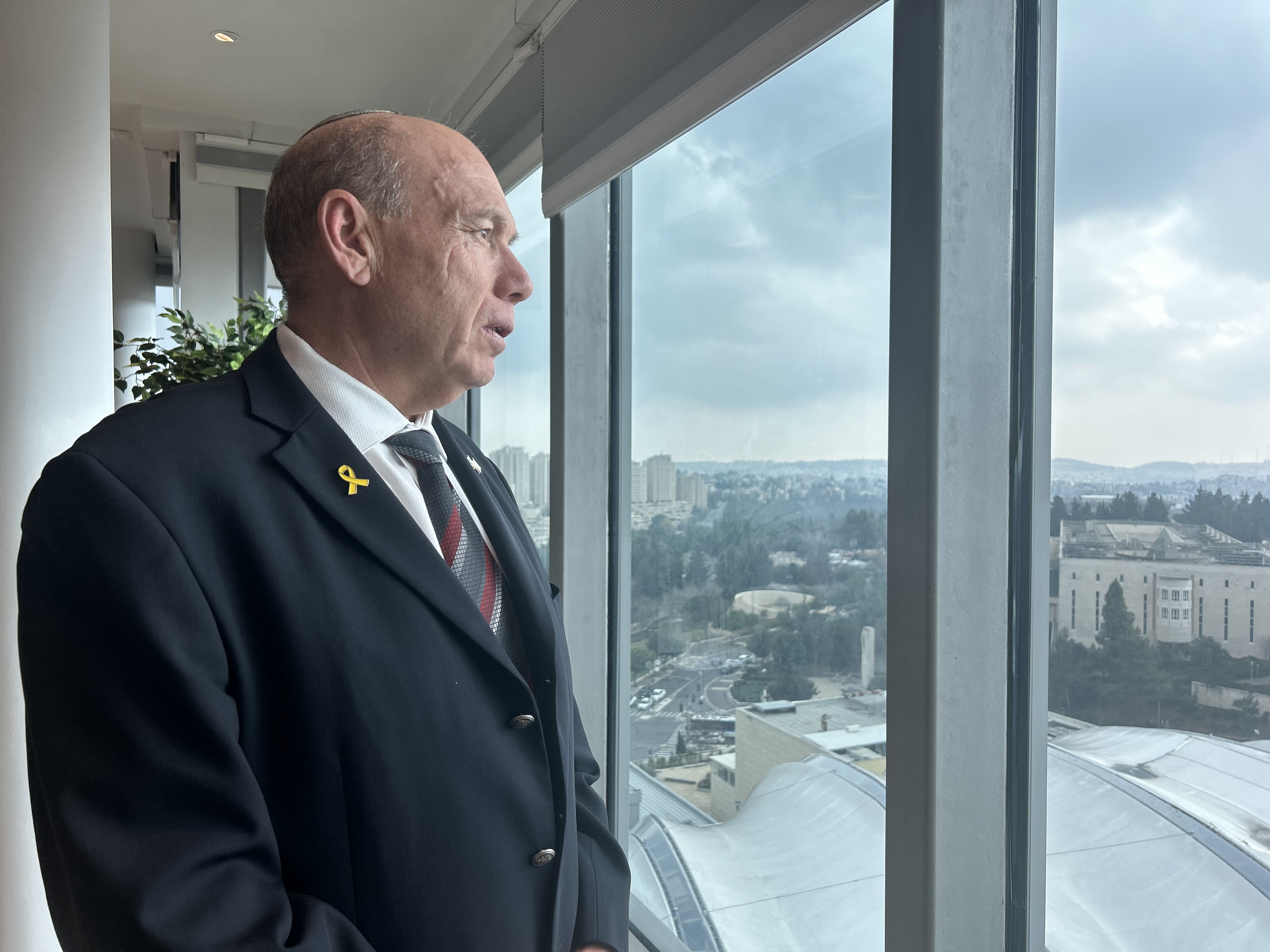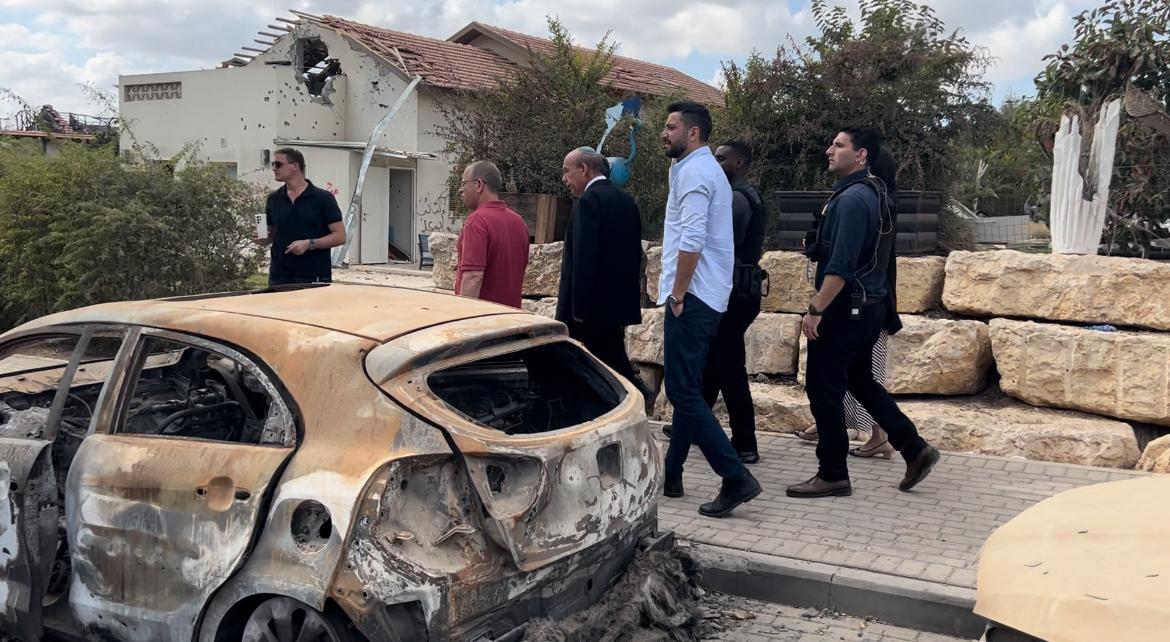State Comptroller and Ombudsman Matanyahu Englman speaks about the failures he uncovered during his field visits since the outbreak of the war and the failures of October 7: "The heroism of individuals on October 7 highlighted even more sharply the failures of the systems". This is the first part of a special interview
Sixteen months have passed since October 7, the Simchat Torah massacre, and the people of Israel are still waiting for answers to a long list of painful questions that have tormented the entire nation since that day, the deadliest for the Jewish people since the Holocaust. As of the time these lines are being written, the only objective entity actively working to provide these answers is the Office of the State Comptroller and Ombudsman.
In this comprehensive interview, published here in two parts, State Comptroller Matanyahu Englman describes how state audits are conducted during wartime, what he has learned from his visits to the field since October 7, and the challenges facing the state audit as it seeks to complete its mission: shedding light on the failures of the political, military, and civilian leadership before, during, and after the massacre, and the commitment to rectifying these deficiencies.
"A disaster has struck Israel"
State Comptroller, before we discuss the war reports, I would like to take you back to October 7. Where were you when it happened?
"We were on a family visit in Canada. During the holiday morning prayer at the synagogue, the rabbi approached me and told me that a great disaster had struck Israel. I spoke with the congregants about the enormous challenge facing the State of Israel in the wake of this heinous terrorist attack. We had planned to continue our trip to New York the next day, but amid all the chaos, it was clear to me that I had to return to Israel on Sunday, and that’s what we did. When we landed in Israel, I went straight to the office. My son, Haggai, was called up for reserve duty. He entered Gaza, and about a month later, he was injured when his tank was hit by a missile. Fortunately, he is doing well now, and I wish all the wounded a quick and full".
Many felt at the time that Israel was experiencing a one-day Holocaust.
"On October 7, the actions of individuals saved the State of Israel. They displayed extraordinary courage and improvisation, risking their lives to try to rescue residents crying out for help. But the heroism of individuals only further underscored the systemic failures".
"The writing was on the wall"
As part of your role, you constantly warn about the vulnerabilities of government authorities and public bodies. Did you ever envision such a total systemic collapse, where Israeli citizens would be abandoned like this?
"I can't say I envisioned such a colossal failure, but the signs and warnings were clearly written on the wall. Three months before October 7, we conducted a snap audit at IDF outposts along the northern border. There was a palpable sense of unpreparedness in defending the borders, and that was at a border considered the most dangerous at the time. The report was scheduled to be released to the public during the week of October 7, but the Knesset's State Control Committee imposed a confidentiality order on it, which has yet to be lifted. I believe the time has come to remove the confidentiality from this report. Even though it was not made public, it was in the hands of the state's and military’s top officials in the period leading up to October 7, and they could have drawn lessons from it".
A culture of "it'll be fine"
"We have identified failures in many other audits conducted by our office in recent years. For example, in our audit of the security barrier, Operation Guardian of the Walls, and other reviews. The reports on these issues point to a common conclusion: our routine preparedness for terrorist threats, in my view, relies far too heavily on a culture of "it’ll be fine", and when things go wrong – on improvisation. And I ask myself, why? This phenomenon was particularly evident in the report we published on the effectiveness of the seam-line barrier. Approximately NIS 8.3 billion was invested in the project, yet our audit found that the barrier was riddled with breaches, allowing tens of thousands of illegal entrants to cross through".
"We see here two main failures: first, the inability to maintain a long-term security approach. If the state invests in a fence but fails to sufficiently invest in crossing points and ongoing maintenance, the effectiveness of the barrier significantly erodes. The second failure is that operational-level officials take the liberty to dictate policy, without necessarily adhering to the required policy, while the political leadership is overly reactive to events. Again and again, our audits reveal that policies are not being properly implemented".
"Listening to criticism"
How do you explain the staggering gap between Israeli excellence—the world-renowned Startup Nation—and the failed handling of the October 7 disaster at all levels? After all, it’s the same country, the same people.
"This gap can be explained in several ways. First, while Israeli ingenuity and improvisation are valuable, they are not necessarily suited for structured governance. Second, a lack of willingness to listen to criticism and accept differing opinions; this applies to the government, the Chief of Staff, and other key figures. Additionally, the government and all public bodies must address the deficiencies highlighted in state audits. When a lower-ranking official raises concerns, saying “the emperor has no clothes” and warning of potential danger, their voice must not be dismissed. We must be receptive to such warnings. Understanding that listening to others enhances decision-making is, in my view, one of the key lessons of October 7. This is also the secret behind Startup Nation’s success – the ability to think outside the box and create a diverse environment that brings different perspectives into the conversation".
Right after the war began, you went out into the field. Over the following months, you and your team conducted dozens of visits across the country. What was the significance of this?
"I believe that for an audit to be truly effective, it must be grounded in firsthand experience. At the time, I told the division heads in my office: look people in the eye; listen to them. Envision them before you as we begin writing the audit reports on the war, because behind every report are real people".
"We continue to experience the importance of these visits to this day, as we recognize that we are the only objective and independent body examining this failure, scrutinizing all echelons – the political, military, and civilian leadership".
Strengthening public service
What stood out to you the most in the field?
"The visits allowed us to identify issues that required immediate resolution, and we promptly relayed them to the relevant authorities for action. About a month after the massacre, I sent a letter to the prime minister detailing a series of failures I had witnessed on the ground that needed immediate attention – from under-equipped emergency response units to the handling of evacuees from the south and north".
"There is also great significance to these visits in terms of strengthening the relationship between the state audit and the public in Israel, as well as meeting those most profoundly affected on October 7. When you see them before you and they tell you: 'I lost my daughter here'; 'I lost my spouse'; or 'I barely survived and waited for hours until someone answered my call'. You then realize that those responsible will have to be held accountable to the public".
"Alongside the audit divisions, the second arm of our office—the Ombudsman—also took action on the ground. Three days after the massacre, standing amid the ruins of the Sderot police station, I announced the launch of the Ombudsman’s emergency hotline, a telephone center designed to assist residents who had been harmed by public entities during the state of emergency. But we didn’t stop there: Ombudsman teams visited the evacuation centers where displaced residents were staying, offering a listening ear and helping them overcome bureaucratic obstacles with the authorities. By December 2023, we had already published a special report by the Ombudsman analyzing the complaints and inquiries received in the first weeks of the war, highlighting serious deficiencies".
A battlefield in the kibbutz
Which of the site visits impacted you personally the most?
"We arrived in Be’eri with the then-head of the Eshkol Regional Council, Gadi Yarkoni, 11 days after the massacre. During the visit, Gadi was informed that another body of a Be’eri resident had been found and that there was another indication of someone having been abducted. I walked among the burned and destroyed houses, where abandoned sukkahs still stood in the yards. You see a peaceful neighborhood that had turned into a battlefield – hell on earth."
"We arrived in Sderot three days after the war broke out and found a devastated city where about 50% of the residents had still not been evacuated, particularly among vulnerable populations. We helped the mayor reach the relevant authorities to ensure that all residents would be evacuated".
In the second part of the interview, Comptroller Englman discussed the audit being conducted by his office on the failures of the war and the challenges faced by the state audit.













